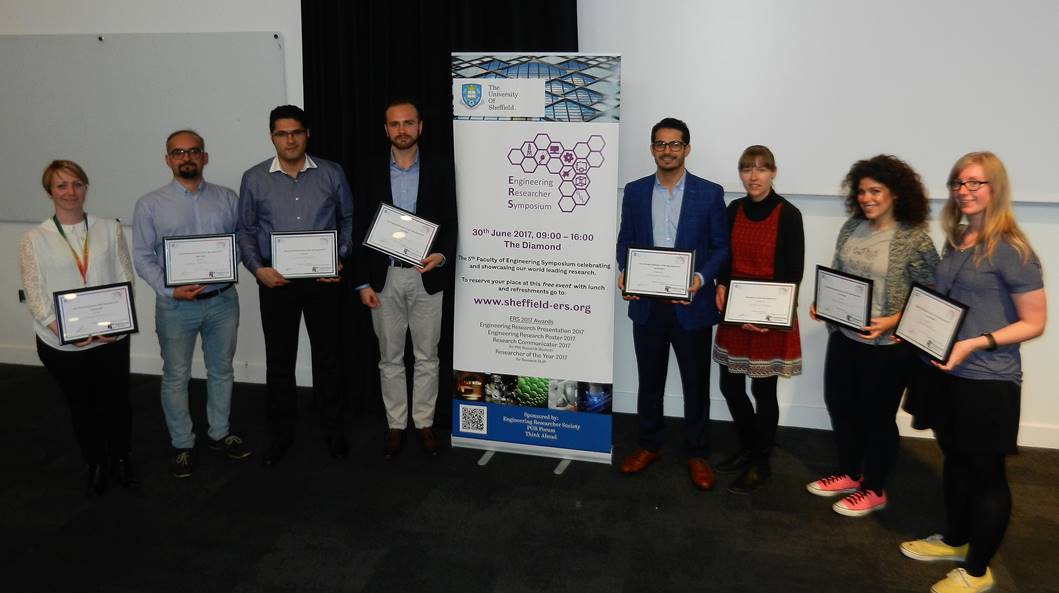I have now attended three poster competitions, one of which I won a prize for. The first competition that I attended was STEM for Britain 2017. I delivered my work to MPs. I was so excited but also incredibly nervous. I sent my poster to my supervisor for re-draft after re-draft and got everyone I could to look at the poster, until they were sick of the site of it! It was an excellent competition and a great experience
but I did feel very much out of comfort zone. I felt quite proud of myself by the time it was over- as though I had done well and really achieved something.
The second was The RSB East Midlands Postgraduate Poster Competition 2017. There was a lot of waiting at this one, it was not as strict for time as STEM for Britain has been. But I really enjoyed the waiting time, just to talk to the other presenters and find out they were actually as nervous as I was. It was a lot easier to network with presenters, rather than people who had come to the event to view the posters. I felt more confident going into it and even more so by the end, when I realised that all of the postgrads were in the same boat.
My most recent poster competition was at The University of Sheffield Engineering Researcher Symposium 2017. I felt very comfortable in this sort of environment now and saw it as an opportunity to talk to people, rather than feeling as though I was being examined, interviewed, almost. I won second prize and felt very proud that I had gone from a complete beginner to feeling comfortable enough to talk about how to produce a poster and how to tackle the competition itself, in just a few months.

How to Produce an Academic Poster
- Firstly, read the competition guidelines. Do you have to submit it in a template? In a certain format? With a particular logo?
- Open PowerPoint and set it up in the right format/ size /orientation required by the competition poster e.g. A1, A2. Make sure that this is right because it is a nightmare to change it afterwards.
- Add Guidelines in View---Show---Guidelines, if you think they might help you line everything up better.
- Add some boxes which will form the basic structure of your poster.
- Not using PowerPoint but using a plain peace of paper, decide what you need to include in your poster. Think of it as a summary of your work to date for people who do not know what you are researching. It could cover: why you are doing the research, what research you are doing, how you are completing the research, what results you have found so far and what you plan to do in future. To properly know what you needs to be included, make sure you know who your audience will be. Make sure you know what you want to say and then fill out your piece of paper with what you wish to cover in each section.
- Write all your information that needs to be included onto the poster. Then try to replace each paragraph or set of bullet points that you have used, with images. So, for example, I did the below.
- When all of your information is in place, print out your poster to see how it looks and then improve it e.g. make sure there is plenty of white space, the font is big enough to read, it uses a specific colour scheme, no images have poor resolution, add effects to titles to make them stand out.
- Make sure your contact details stand out. Add your name, university, supervisors (if you wish to), email address and then less common contact details e..g. a QR code to your website or your Twitter name (assuming it is a professional Twitter account).
- Get it printed! I have used paper and cloth recently. I preferred the cloth because it was a lot easier to store in my home after the competition (also you can use it as a cape if you win or a comforting blanket if not).
- Prepare for the day by ensuring you have smaller copies of your poster with additional information on the back and business cards. It may also be useful to being something with you to attach these extra items to your poster board. I saw this great example of additional poster material presentation at a poster competition at the IWA Young Water Professionals Conference 2017.

Attendance at the Poster Competition
A few final tips:
- Firstly, congratulate yourself, you have finally made it!
- Try to not spend too much time away from your poster because you might be unlucky and miss a judge
- Look presentable and try to look welcoming
- Talk to your neighboring poster entrants. You may think they might be competition but it is an excellent networking opportunity
- Don't be afraid to give people your business cards and handouts. That might be the reason why they are there
- Have an elevator pitch prepared. Think of yourself as selling your work in a few minutes. Try not to talk in a monotone. Just be honest and explain why you are interested in your work
- My final tip is that if you win any prize money, use it to celebrate, otherwise it will just get lost in your normal money. Treat yourself, even if it is something small and think to yourself that you earned it by spending the day at that competition.




